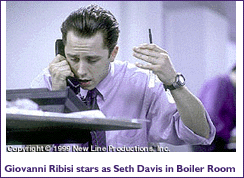|
The heat on 'Boiler Room'
|
 |
February 18, 2000: 6:33 a.m. ET
Stock cops say movie hits share-fraud mark with writer's first-hand insight
By Staff Writer Alex Frew McMillan
|
NEW YORK (CNNfn) - Maybe Notorious B.I.G. said it best: to make it big, "either you got a wicked jump shot or you're slinging crack rock," Seth Davis quips in the opening to Boiler Room. "Nobody wants to work for it anymore."
In a world of yellow Ferrari cabriolets, gold chains and Long Island mansions, of Internet stocks shooting through the roof and Microsoft secretaries who become sudden millionaires, Davis takes what he calls the "white-boy way of selling crack rock" -- stock brokering. Or stock swindling in the case of Davis, the movie's lead character who's played by Giovanni Ribisi.
As the film opens Davis, a college dropout, is slowly trying to cut a straight and narrow career path in an effort to please his father, a judge. And the temptation of turning a million dollars within his first three years, as his recruiter at J.T. Marlin assures him he will, doesn't hurt.

But Exit 53 on the Long Island Expressway is a wrong turn for Davis. J.T. Marlin soon proves distinctly removed from the respectable brokerage he first thinks it is. "You're a stock broker. You wear a suit to work every day, don't you?" his mother beams.
As Davis works to sign 40 accounts and to pass his Series 7 stock-brokering exam, his first big payday is approaching. And as it creeps nearer and nearer, he learns a little more about the people he's working for. With every promise of a dollar, he gradually finds himself more and more ensnared in the underworld of cold-calling pump-and-dump stock schemes.
They've heard this story before
"Always Be Closing," get the stock out the door, and reap those big commissions. "Who cares where they come from?," his mentors teach him. In the "Boiler Room" world, where "Glengarry Glen Ross" meets "Wall Street" -- and the movie nods to both those predecessors -- the brokers prey on the greed and gullibility of an unsuspecting public hungry for stock tips. Seven hundred calls a day and you'll find some sucker who will happily turn over his life savings to a voice he's never met coming down a line from who knows where. Remember, you can be who you want to be on the phone.
"I think we know the story. I see it every day," said Brad Skolnik, president of the North American Securities Administrators Association and an Indiana securities regulator. "In many ways, it's an age-old crime that's been with us since the telephone."
There's a reason "Boiler Room," which opens Friday from New Line Cinema (owned by CNNfn's parent, Time Warner), rings true to professionals who battle such operations every day. The film's writer and director, Ben Younger, happened into an interview with a bona fide boiler room on Long Island five years ago. He was looking for a job to support him as he started his writing career.
"There was no foresight on my part," Younger, who lives in Brooklyn, recalled. "But if you had walked in on that day, you would have known immediately something was going on."
With his bachelor's degree, Younger, now 29, figured he'd be the youngest and least educated of the bunch. Not quite.
"I would be surprised if half of them had high school diplomas," he said. "They were 17, 18 years old, playing Gameboys. It was unbelievable. I thought I'd be sitting in a room with a bunch of MBAs."

Like the military, the boiler rooms want young guys they can shape, Younger says. Anyone with a Series 7 was out -- they'd have presupposed notions about how you're supposed to sell stock. "You get a young male at that age, he's at his most impressionable. You can mold him," he said.
As in the movie, the interview was like a Fascist Youth rally, "half an hour of this recruiting officer yelling at us about how much money we were going to make over the next couple of years," Younger said. Unlike Davis, Younger walked away. "But I was happy because right away I knew I had found my screenplay subject."
A surprisingly easy world to infiltrate
Younger spent two years researching his debut movie, visiting seven Long Island brokerages and interviewing 40 boiler room operators. "I thought it was going to be a very difficult world to infiltrate," he remembers. "And it turned out to be the easiest thing in the world."
At first, unsure of where his research would lead, he said he was thinking about developing a book or a documentary. Once the idea for a film occurred, "I actually tried to hide the fact that I was doing a movie. When I couldn't hide it any longer, they opened up twice as quickly, and twice as many friends of theirs wanted to come and interview," he said. "These guys loved to talk to me about what they were doing."
Younger, who didn't know a thing about Wall Street or trading stock, says he was shocked how bad their sales tactics were, the odd exceptional salesman aside. Even though he got a copy of one of the boiler room's pitch books, he had to rewrite their pitches for the movie to make them less aggressive and "a little more cajoling." No one would believe any sane person ever bought stock from them otherwise, he jokes.
In fact, Younger says a couple of his contacts reviewed his lines and actually adopted them. "They seemed to do well. Thankfully that firm was closed down about three months later, so they didn't make that much off my pitches," he said.
 Younger learned himself. He now trades online, dabbling in day trading, mainly in tech and telecommunications stocks. He's just given up on pharmaceuticals, he says, realizing he shouldn't be trading stocks he knows nothing about. Younger learned himself. He now trades online, dabbling in day trading, mainly in tech and telecommunications stocks. He's just given up on pharmaceuticals, he says, realizing he shouldn't be trading stocks he knows nothing about.
"I love it," Younger said of his trading. "I'm actually getting a little bit too caught up. I've got to cool it a little, because I've got to get back to writing." He is working on a romantic comedy that he also hopes to direct. He says he will likely never do another finance-related film.
Victims not entirely innocent
Though "Boiler Room" paints a sympathetic picture of the stock swindlers' victims, Younger thinks most of the real-life customers who buy stock over the phone just found the right voice calling them at the right time.
"I think they're looking for it. They're just looking for that little nudge," he said. He believes any normal person would just hang up the phone.
Younger has one piece of advice: don't buy stock over the phone. "I'm against anyone who calls me at my house that doesn't know me. So my advice is, don't buy anything from anybody who calls you over the phone," he said. "What, because I subscribe to Money magazine, this is their big tip off that I'm a prospective client?"
But a surprising number of people still fall for the cold-call sales pitch, securities cops say, and every now and then that means they're playing into a swindler's hands.
The most obvious targets are the "widows and orphans, first-time investors, the elderly," said Bill McLucas, former director of enforcement for the Securities and Exchange Commission and now a partner with the law firm Wilmer, Cutler & Pickering in Washington. But the victims are really across the board -- some of them "quite sophisticated, and quite able."
Not completely gone
Stock boiler rooms had their heyday in the mid-'90s, regulators say, stemming almost inevitably from the boiler-room capitals of the country: Long Island in New York, northern New Jersey, Boca Raton, Fla., Denver, and La Jolla and Los Angeles in southern California. Most worked through cold calling, and some also operated via word of mouth.
The high-profile busts of large operations such as Sterling Foster and Stratton Oakmont, which at one point had 200 boiler-room stock jocks logging 1.25 million calls a month, have been and gone. Coupled with investors who seem savvier and more likely to do their own trading online than over the phone, boiler-room activity has dropped, regulators say.
But dropped doesn't mean disappeared. There are 80 to 90 stock boiler-room operations around the country right now, according to Joe Borg, director of the Alabama Securities Commission, who has prosecuted numerous microcap fraudsters. The big operations have closed but the boiler-room brokers have moved on to smaller companies.
"They're harder to catch because they're decentralized," Borg said. "It's like stepping on a thermometer. The mercury spreads all over the place."
Swindlers come in all shapes and sizes
If the victims are varied, so are the boiler-room operators themselves. "All sorts of characters get involved in this," McLucas said. Common denominator? They're all chasing big, quick bucks, no experience, no education necessary.
While most realize what they're doing soon enough, if they don't figure it out right away, they learn not to care. In "Boiler Room," the brokers may suspect there's something wrong with the stock they're selling, but they learn not to ask too many questions. Their clients are meaningless names they scrape together from records at the motor vehicle department.
The details may differ, but that's pretty much how it goes down, according to McLucas. "Look, there's an impersonality to this, to selling stock down the phone," he said. "In the end, you can convince yourself it's just a game, and you make money, and it's just paper, and these aren't real people."
Boiler rooms on the Web
Stock swindlers are increasingly likely to use the Internet either to promote and tout stock or just to set up a Web page that gives them a respectable front. They often focus on people who are likely to have discretionary income -- owners of small businesses, for instance, or business executives, information they can glean from sources such as Dun & Bradstreet and the like.
Skolnik jokes that he can't judge the artistic merit of "Boiler Room," and his day job isn't writing movie reviews. But he agrees with Younger that there's a rule you should live by in real life if you and your investments want a happy Hollywood ending.
"Think about it. Almost none of us would ever get legal advice or medical care from a stranger over the telephone," Skolnik said. "The most important advice we give people is (that) they should never invest with strangers over the telephone." 
|
|
|
|
|
 |

|

